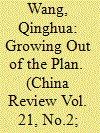|
|
|
Sort Order |
|
|
|
Items / Page
|
|
|
|
|
|
|
| Srl | Item |
| 1 |
ID:
168354


|
|
|
|
|
| Summary/Abstract |
The actual energy savings from efficiency improvement may be less than expectations because of behavior response of micro-units, which is named as rebound effect. For producers, the magnitude of such response depends on the operating flexibility. However, the precise; role of operating flexibility in rebound effect is still unknown because of difficulties in measuring operating flexibility. Over the past four decades, the Chinese government has implemented a wide range of reforms aiming at market-oriented transition, which increase operating flexibility of micro-units. It is natural to be questioned whether China's market-oriented reform increases energy rebound effect. In this study, we aim to explore the impacts of marketization on rebound effect. Using partially linear functional-coefficient panel data model to avoid prior criteria in model specification and smooth the change of rebound effect across regions, we found that about 20% of originally expected energy conservation from energy efficiency improvement would be rebounded in 2013. Furthermore, the results demonstrate that in line with China's uneven reform across regions, coastal provinces such as Jiangsu, Zhejiang, Tianjin, Shanghai, Beijing, and Guangdong, have larger rebound effects, which may be connected with their larger operating flexibility. The findings can enhance our understanding on the mechanisms of rebound effect as behavior responses. We also anticipate our paper to provide knowledge and broader implications toward optimal policy designs alongside China's ongoing market-oriented reforms.
|
|
|
|
|
|
|
|
|
|
|
|
|
|
|
|
| 2 |
ID:
180453


|
|
|
|
|
| Summary/Abstract |
This article examines market-oriented reforms in China’s graduate placement system (GPS) of higher education during 1978–1994 when China’s GPS was transformed from a state-controlled and centrally planned Soviet type to a rudimentary market model. Its goals are twofold. First, it advances the scholarship on GPS reform, a subject that is underresearched in studies of Chinese politics and of Chinese education. Second, it analyzes reform features by engaging the “gradualism” school on the political economy of China’s economic transition, especially Barry Naughton’s widely accepted “growing out of the plan” version of Chinese “gradualism” in 1978–1993. Through this process, the article sheds light on our understanding of the perennial debate about China’s economic transition. We argue (1) that GPS reform during 1978–1994, in retrospect, adopted a gradualist “dual-track” approach and was successful, much like China’s economy in that period; and (2) that the applicability of perspectives of the “gradualism” school can be extended from the customary confines of economic sectors to a social policy sector of higher education.
|
|
|
|
|
|
|
|
|
|
|
|
|
|
|
|
|
|
|
|
|